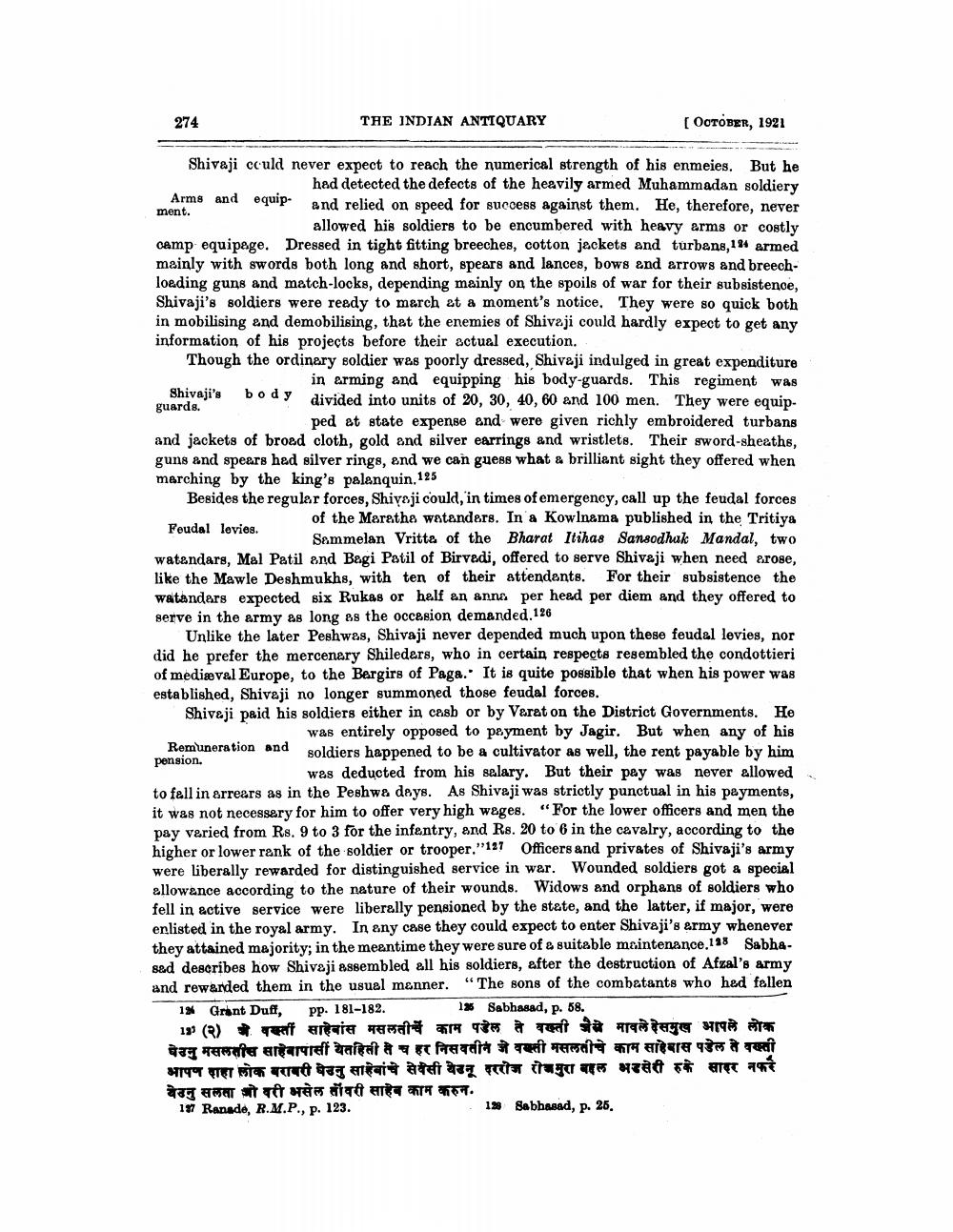________________
274
THE INDIAN ANTIQUARY
OCTOBER, 1921
Shivaji could never expect to reach the numerical strength of his enmeies. But he
had detected the defects of the heavily armed Muhammadan soldiery Arms and equip and relied on speed for success against them. He, therefore, never ment.
allowed his soldiers to be encumbered with heavy arms or costly camp equipage. Dressed in tight fitting breeches, cotton jackets and turbans, 184 armed mainly with swords both long and short, spears and lances, bows and arrows and breechloeding guns and match-locks, depending mainly on the spoils of war for their subsistence, Shivaji's soldiers were ready to merch at a moment's notice. They were so quick both in mobilising and demobilising, that the enemies of Shivaji could hardly expect to get any information of his projects before their actual execution. Though the ordinary soldier was poorly dressed, Shivaji indulged in great expenditure
in arming and equipping his body-guards. This regiment was Shivaji's body divided into units of 20, 30, 40, 60 and 100 men. They were equip. guards.
ped at state expense and were given richly embroidered turbans and jackets of broad cloth, gold and silver earrings and wristlets. Their sword-sheaths, guns and spears had silver rings, and we can guess what & brilliant sight they offered when marching by the king's palenquin, 125 Besides the regular forces. Shivaji could, in times of emergency, call up the feudal forces
of the Maratha watenders. In a Kowlnama published in the Tritiya Feudal levies.
Sammelan Vritta of the Bharat Itihas Sansodhak Mandal, two watendars, Mal Patil and Bagi Patil of Birvedi, offered to serve Shivaji when need arose, like the Mawle Deshmukhs, with ten of their attendents. For their subsistence the watandars expected six Rukas or half an anna per head per diem and they offered to serve in the army as long as the occasion demanded.126
Unlike the later Peshwas, Shivaji never depended much upon these feudal levies, nor did he prefer the mercenary Shileders, who in certain respects resembled the condottieri of medieval Europe, to the Bergirs of Paga.' It is quite possible that when his power was established, Shivaji no longer summoned those feudal foroes. Shivaji paid his soldiers either in cash or by Verat on the District Governments. He
was entirely opposed to payment by Jagir. But when any of his
soldiers happened to be a cultivator as well, the rent payable by him pension.
was deducted from his salary. But their pay was never allowed to fall in arrears as in the Peshwa days. As Shivaji was strictly punctual in his payments, it was not necessary for him to offer very high weges. "For the lower officers and men the pay varied from Rs. 9 to 3 for the infentry, and Rs. 20 to 6 in the cavalry, according to the higher or lower rank of the soldier or trooper.":127 Officers and privates of Shivaji's army were liberally rewarded for distinguished service in war. Wounded soldiers got & special allowance according to the nature of their wounds. Widows and orphans of soldiers who fell in active service were liberally pensioned by the state, and the latter, if major, were erlisted in the royal army. In any case they could expect to enter Shivaji's ermy whenever they attained majority; in the meantime they were sure of & suitable maintenance.198 Sabha sed describes how Shivaji assembled all his soldiers, after the destruction of Afzal's army and rewarded them in the usual manner. “The sons of the combatants who had fallen
13 Grant Duff, pp. 181-182. 196 Sabhasad, p. 68. 10 (2) 2. वक्ती साहेबांस मसलतीचे काम पडेल ते वस्ती जैसे मावले देसमुख आपले लोक घेउनु मसलतीस साहेबापासीं येतहिती ते चहर निसवतीन जे वस्ती मसलतीचे काम साहेबास पडेल ते वस्ती आपण पाहा लोक बराबरी घेउनु साहेबांचे सेवेसी बेउनू दररोज रोजमुरा बहल भरसेरी रुके सादर नफरे बेउनु सलता जो बरी असेल तोवरी साहेब काम करुन. 197 Ranade, R.M.P., p. 123.
19 Sabhasad, p. 25.




